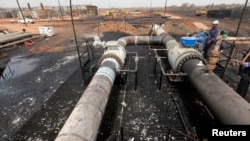JUBA —
South Sudan made almost $1 billion from oil sales since resuming production in April, of which it had to pass on a quarter to arch foe Sudan for exporting crude through its territory, the oil ministry said on Thursday.
The landlocked African nation needs to export the crude, its economic lifeline, through two pipelines crossing Sudan, from which it seceded in 2011 after decades of civil war.
The neighbors, which fought one of Africa's longest civil wars ended in 2005, agreed in March to resume cross-border flows. Juba had shut down its oil production in January 2012 when a row over pipeline fees escalated.
Sudan had threatened since April to halt oil exports in a conflict over alleged rebel support but agreed to continue crude flows at a summit of the two presidents on Tuesday.
South Sudan sold around 9.1 million barrels of oil for $969 million until the start of September, its oil ministry said in a statement. It had to pay $91 million in fees for using pipelines crossing Sudan and the Port Sudan port.
An extra $147 million Juba paid as part of a package to compensate Sudan for the loss of most oil reserves with southern secession, as agreed in a deal in September. Juba needs to make this monthly payment to Sudan for more than two years.
South Sudan is producing 180,000 barrels of oil per day (bpd) and plans to add 20,000 bpd after Sudan abandons its threat to halt flows, Nicodemus Ajak Bior, the ministry's press officer, told Reuters.
"Technical teams are meeting and plan to increase the production starting within the next two weeks," he said. "Preparations are on."
He gave no detailed timeline, saying only that it aimed to have an output of 250,000 bpd by the end of the year.
South Sudan used to pump 300,000 bpd until it closed all wells in January 2012. Restarting hundreds of wells has proved a challenge, while some oilfields were also damaged during weeks of border skirmishes between the two countries in April 2012.
Sudan needs the pipeline fees as badly as the South does the oil sales to stabilize its ailing economy. Oil used to be Sudan's main export product until southern secession.
The landlocked African nation needs to export the crude, its economic lifeline, through two pipelines crossing Sudan, from which it seceded in 2011 after decades of civil war.
The neighbors, which fought one of Africa's longest civil wars ended in 2005, agreed in March to resume cross-border flows. Juba had shut down its oil production in January 2012 when a row over pipeline fees escalated.
Sudan had threatened since April to halt oil exports in a conflict over alleged rebel support but agreed to continue crude flows at a summit of the two presidents on Tuesday.
South Sudan sold around 9.1 million barrels of oil for $969 million until the start of September, its oil ministry said in a statement. It had to pay $91 million in fees for using pipelines crossing Sudan and the Port Sudan port.
An extra $147 million Juba paid as part of a package to compensate Sudan for the loss of most oil reserves with southern secession, as agreed in a deal in September. Juba needs to make this monthly payment to Sudan for more than two years.
South Sudan is producing 180,000 barrels of oil per day (bpd) and plans to add 20,000 bpd after Sudan abandons its threat to halt flows, Nicodemus Ajak Bior, the ministry's press officer, told Reuters.
"Technical teams are meeting and plan to increase the production starting within the next two weeks," he said. "Preparations are on."
He gave no detailed timeline, saying only that it aimed to have an output of 250,000 bpd by the end of the year.
South Sudan used to pump 300,000 bpd until it closed all wells in January 2012. Restarting hundreds of wells has proved a challenge, while some oilfields were also damaged during weeks of border skirmishes between the two countries in April 2012.
Sudan needs the pipeline fees as badly as the South does the oil sales to stabilize its ailing economy. Oil used to be Sudan's main export product until southern secession.





